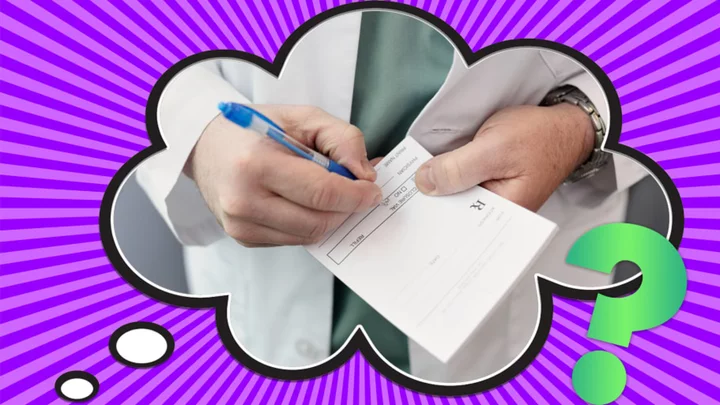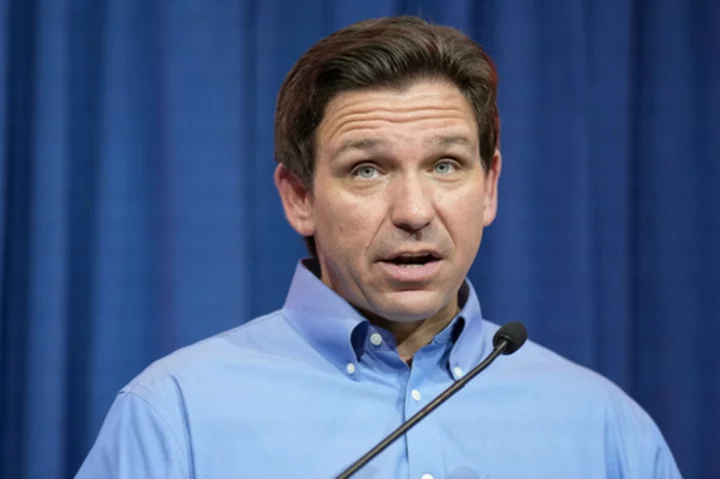PHOENIX (AP) — A $17 billion budget package that Arizona Gov. Katie Hobbs negotiated with leaders of the Republican-controlled Legislature and won approval on Wednesday is drawing criticism from Democrats for failing to put limits on an expansion of a school voucher program that they say is a drain on the state’s coffers.
The Democratic governor came into office in January with plans to undo the massive explosion in the voucher program, championed by her GOP predecessor Gov. Doug Ducey, that lets students apply to use public money for private-school tuition and other education costs.
Hobbs’ office had said the expansion siphons money from underfunded public schools and would cost $1.5 billion over the next decade.
The governor didn’t propose doing away with all vouchers, but she wanted to return to the voucher program to what it was before Ducey expanded it to include every child in the state -- when disabled children, students living on American Indian reservations, students attending low-performing public schools and others were eligible for voucher funds.
Despite her criticism of the expanded vouchers, the budget proposals negotiated by Hobbs didn’t include any caps on the expansion.
Even as they heaped on criticism of the budget, some Democratic lawmakers still voted for elements of the package and lauded its $300 million increase in K-12 education funding and another $150 million for a fund that helps people with low-income housing, an eviction-prevention program and transitional housing.
Earlier on Wednesday, the Senate approved the budget package, with support from some Democratic legislators. The package will be sent to Hobbs for her consideration.
In a statement, Hobbs said she looked forward to signing the package into law and was “thankful legislative leaders were able to set aside their differences, compromise, and support a bipartisan deal.”
Democratic Rep. Cesar Aguilar of Phoenix said the Legislature was passing a budget crafted by Republicans, not by Democrats.
“I have seen budgets in the past when we’ve had Republican governors,” Aguilar said. “It has always been given to Democrats in the last minute. Today, many of us Democrats helped Gov. Hobbs get elected, and I personally thought maybe this year wouldn’t be a lot different. But that is not the case. Democrats seem to be in the same boat as if we would have had a Republican governor.”
During the debate on the House floor, most Democratic lawmakers shied away from directly criticizing Hobbs but expressed dissatisfaction with the budget’s lack of action on the voucher expansion. They tried unsuccessfully to bar applications for new enrollments until late May 2024.
Nearly 12,000 students participated in the program before it was expanded. More than 55,000 students are currently in the program. The average scholarship amount now stands around $10,000 per student.
At a news conference on Monday, Hobbs was asked about the budget’s lack of action in limiting the program.
“I think we can agree that the voucher program is a drain on resources that should be directed at public education,” Hobbs said. “But I didn’t say I was going to end it. It is a goal, certainly.”
Backers of the voucher expansion say it allows parents to choose the best schools for their children.
Like other Republicans, Rep. Justin Heap of Mesa disputed that public education was being undercut by the voucher expansion and would bankrupt the state.
Heap said criticizing the voucher program is actually an attack on students and their families who rely on the vouchers. “They have the audacity to to take their children out of a government school and put them into a better program,” Heap said.
Arizona now has the nation’s most expansive private school voucher law. It allows parents of the more than 1.2 million school-age children to get 90% of the state money that would normally go to their local public school and use it for private or other school costs.
The voucher system started in 2011 with a small program that only applied to disabled children, who can receive up to $40,000 a year for specialized therapy. The Republican-controlled Legislature expanded it repeatedly over the past decade.
Before the universal expansion took effect, it also covered students living on American Indian reservations, attending low-performing public schools and several other groups.
In a statement, Marisol Garcia, president of the Arizona Education Association, a union that represents teachers, said she was glad the budget included the one-time infusion of $300 million into K-12 public schools and other funding for schools.
But Garcia expressed frustration over the lack of limits on the voucher program.
“The extremist majority in our state Legislature has ignored the will of Arizona voters and pushed through policies that bankroll private schools for the wealthy at the cost of the public schools attended by 90% of Arizona kids,” Garcia said.
On Wednesday, leaders in the Arizona House announced the creation of a special committee to examine vouchers. The panel’s members will include Democratic and Republican lawmakers, Hobbs and State Superintendent of Public Instruction Tom Horne.









